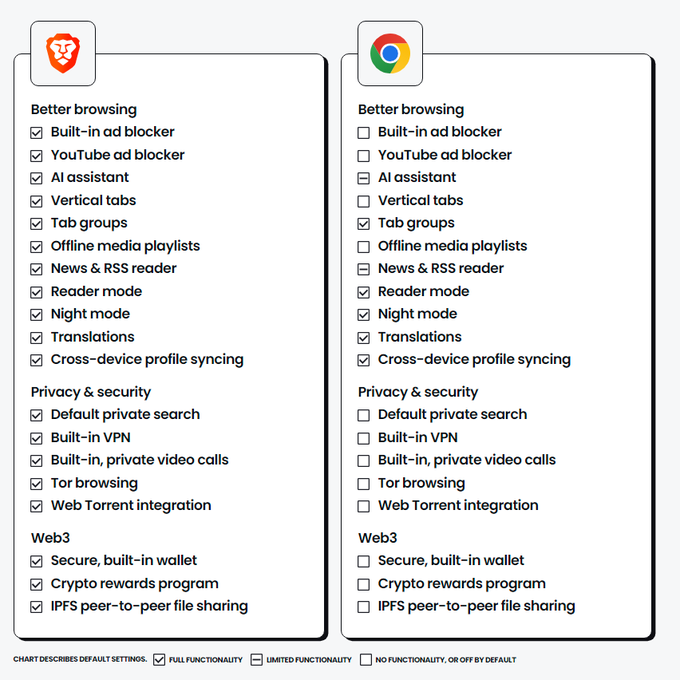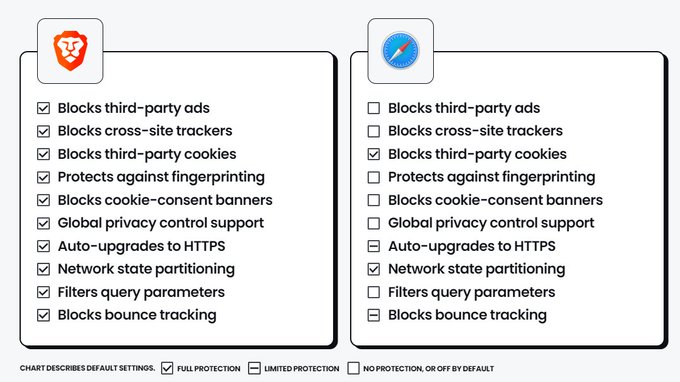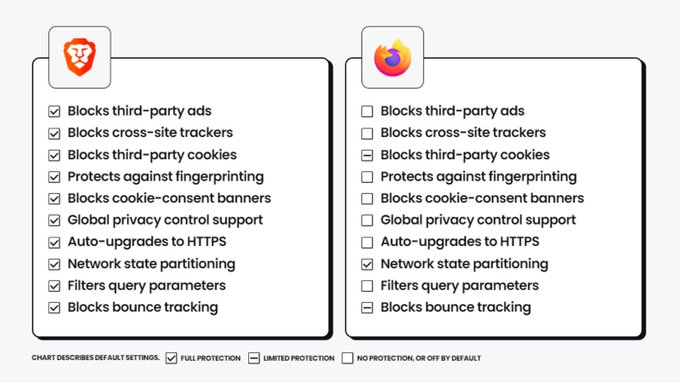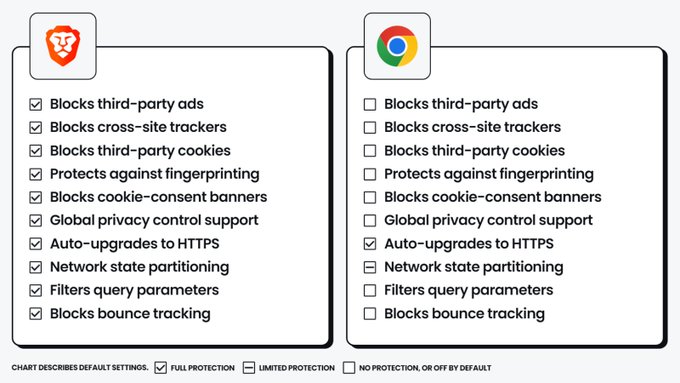Brave Browser Outperforms Safari and Chrome in Privacy and Features
Brave Browser Outperforms Safari and Chrome in Privacy and Features
🔒 Brave Beats the Rest

Recent reports indicate that the Brave browser offers superior privacy protection compared to Safari and Chrome. While Safari is considered more private than Chrome, it still falls short of Brave's capabilities. Brave blocks various threats, including trackers, cookies, and fingerprinting techniques, by default. Additionally, Brave boasts numerous custom features that are absent in Safari. In contrast, Chrome is built for tracking and allows ads, trackers, and cookies to record user activity. Brave not only outperforms Chrome in privacy but also offers helpful features that Chrome lacks.
Sure, Chrome doesn't offer the same privacy protections but it must have more features, right? Well...no. Brave offers many helpful features that Chrome doesn't.
Safari is considered more private than Chrome but it still doesn’t match up to Brave.
Firefox is better than Big Tech options like Chrome or Edge. It does block some cookies, trackers, and some limited fingerprinting techniques. But much of the worst—or most hidden—stuff still gets through. Brave, however, blocks those threats by default.
Chrome is built for tracking. It allows creepy ads, trackers, cookies, and more to record everything you do. Brave, meanwhile, is built for privacy. It blocks all that (and more) by default.
zkKYC Launches Privacy-First Identity Verification Without Data Collection
**zkKYC** is introducing a new approach to identity verification that prioritizes privacy. **Key features:** - Proves identity without collecting or storing personal data - Uses cryptographic proofs instead of traditional KYC methods - Built on zkTLS technology for cross-ecosystem verification - Eliminates intermediaries and data exposure risks The system transforms conventional KYC into privacy-preserving proofs that can be verified across different platforms while keeping personal information completely untouched. This represents a shift from asking "who you are" to cryptographically proving it without revealing underlying data.
Brave Wallet Launches Nightly Testing Program with Bounties
Brave has launched its **Wallet Nightly Program**, inviting users to participate in early testing and development. **Program features:** - Early access to new wallet features - Bounty rewards for finding issues - Direct input into product development - Focus on responsible security testing The initiative aims to improve Brave Wallet by incorporating feedback from active users and security researchers. Participants can help shape the wallet's future while earning BAT token rewards for their contributions. The program is now accepting applications for those interested in testing pre-release features.
🎮 Brave Games: Reality-Style Heist Competition Launches February 2026
**Brave Games**, a community-powered reality-style heist competition, launches in February 2026 with real prizes at stake. **Three factions compete:** - 🦁 Brave - 🔒 Midnight Network - 🎮 Mythical Games **How it works:** - Multi-round missions requiring players to decode encrypted clues - Navigate alliances and betrayals - Outplay rivals across challenges - Part heist, part mind game, part game show **Prize partners include:** Doodles, $GUANO, Moonbirds, Unstoppable Web, and WallStreetBets. Built by Fanonclub, player registration opens soon at [thebravegames.com](http://thebravegames.com). A special discussion featuring Brendan Eich (Brave), Charles Hoskinson (Midnight Network), and John Linden (Mythical Games) is scheduled for January 27.
BAT Issues Scam Warning About Fraudulent bags.fm Association
**Basic Attention Token (BAT) has issued an official warning** about fraudulent associations with bags.fm and fake profiles claiming connections to @AttentionToken or @BAT_Community. **Key Points:** - BAT is **not affiliated** with bags.fm or any related profiles - Users should only trust official BAT channels for information - Always verify sources before engaging or making transactions This warning follows previous alerts about scammers impersonating Brave team members on Telegram, promoting fake events and requiring suspicious downloads. **Stay safe:** Only rely on verified official channels and double-check all sources before taking action.
🎮 Mythical Games Joins Brave Games Heist Showdown

**Three-way competition confirmed for Brave Games** Mythical Games has been revealed as the third faction joining the upcoming Brave Games heist competition, scheduled for early 2026. **The competing factions:** - Brave - Midnight Network - Mythical Games The announcement follows weeks of speculation after two factions were initially confirmed in December 2025, with the third participant's identity kept under wraps. The vault-cracking competition is set to begin soon, though an exact launch date has not been disclosed.



